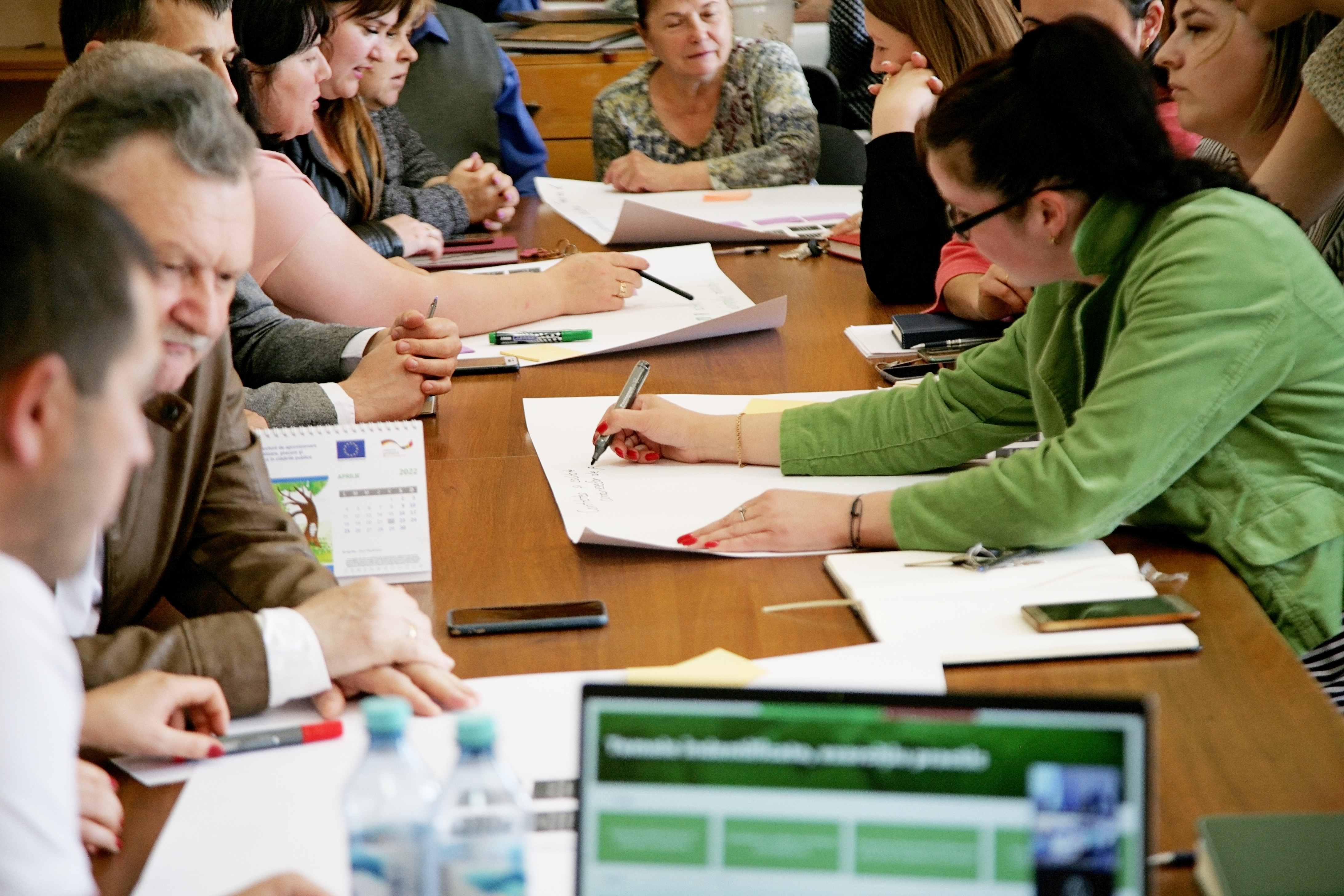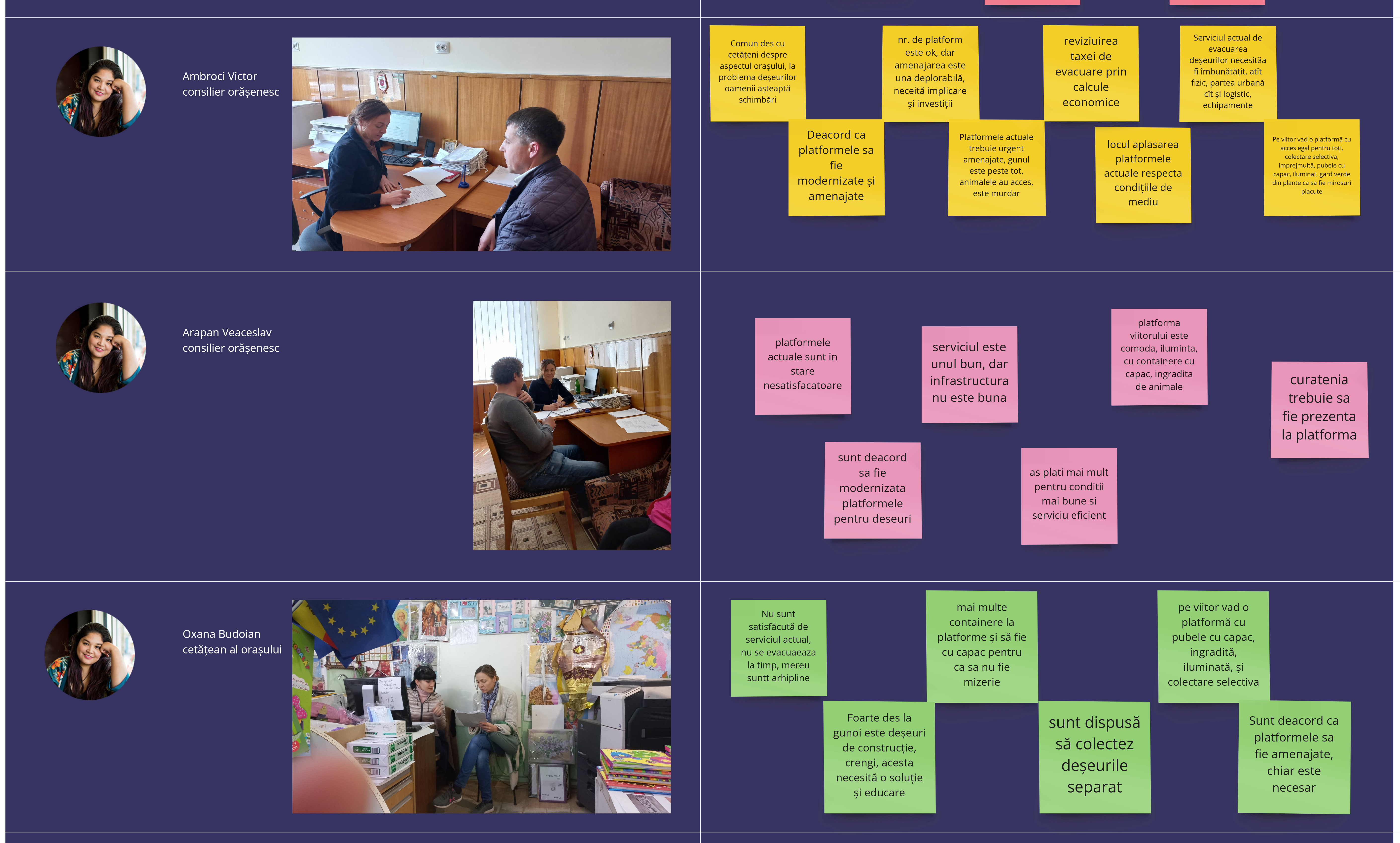The journey of Călărași, Moldova
Can urban waste be reimagined?
July 18, 2022

The Urban Imaginaries session with the municipality team in Călărași
The Călărași town calmly lies along the banks of the river Bîc in the region of the miraculous Moldovan hills of Codru. But not everything is that miraculous, calm, and green. Like many other towns, the town has a waste management problem. What is exciting is that they decided to tackle it in a new way and engage the entire community around it.
“The problem of waste management is relevant for the whole community. Citizens – children and adults, public institutions, companies – everyone is affected. This is a common problem and now we want the engagement of our community to make a contribution and transform the way we live,” says Lilia Rață, Investment Specialist at the City Hall of Călărași and introduces us into a story of re-imagining the urban waste management in Călărași. So how are they going to do it?
The spring of 2022 brought a new way of thinking in Călărași public administration. The municipality boldly embarked on a journey to embrace the future and use complexity-informed approaches to start solving local issues. The new way is called Urban Imaginaries, a new programme within the EU funded Mayors for Economic Growth (M4EG) initiative delivered by UNDP and the Centre for Public Impact (CPI). The programme introduces human-centered design and sensemaking, which can be major catalysts for change because they allow citizens’ voices to be heard and solutions for urban transformation to be co-created. The municipality teams are encouraged to start their journey by selecting a problem they want to focus on, then to reimagine public spaces, and how to engage citizens in the process. The municipality teams are encouraged to experiment and are supported financially to design and demonstrate their solutions with a 60,000 EUR seed fund.
“We are grateful for the opportunity to develop new capabilities that will enhance the human factor and communication with our citizens. Every idea has a beginning and this project teaches us how solutions to a problem can turn into unique and sustainable ideas for our community and be an example for other communities,” said Olari Ion, Mayor of the Town of Călărași.
Identifying the challenge is not as simple as it seems
In the beginning, the municipality team in Călărași identified three priority areas: public transportation services, local economic development and social services for vulnerable populations.
However, after conducting interviews and getting insights from citizens, it became evident that the municipality team needed to change its focus to the issue of waste management. This is because it better reflects current citizen priorities and incorporates the needs and interests of the broader community.
From here, the team began tackling their problem by taking a complexity-informed design thinking approach to understand how to reimagine this service. The first phase is called Discovery, where the team kicked off user research and conducted 13 interviews, reaching out to residents, municipality staff, a local environment NGO and a municipal enterprise. The Discovery phase is crucial as it showcased current challenges of the waste management services in Călărași and most importantly, to understand how it impacts the residents. What followed was called Sensemaking a method to analyze the insights collected during the interviews and to collectively reflect on what they had learned during their interactions with local communities.

“During the Discovery phase, we identified four main issues the team can start reimagining:
- The types of waste containers – what better facilities can we introduce?
- The usage of the waste containers – how can we encourage residents to separate the waste and adopt green habits?
- Container safety in waste management – how can we improve habits around waste?
- How can we improve service of waste disposal?”
the municipal team in Călărași concluded.
Innovations for cities’ redesign and reorienting towards residents
As a part of the Urban Imaginaries learning journey, city municipalities are exposed as well to several other innovation methods such as design thinking, future foresight, storytelling for systems change and human learning systems. All of these will help to reimagine urban spaces and deliver greater impact to residents.
Reflecting on these new methods, Lilia says: “We were curious and open-minded towards absorbing the new methodology on design thinking through training and mentorship sessions. It's a challenge because we haven't used these methods before. I see the benefits of this approach as it helps us understand better the community’s perspective and their ideas on addressing the challenge we are trying to solve. Our residents were open to sharing their solutions with the city administration, which confirmed that we are moving in the right direction”.
To fully harness the benefits of these methods, teams, such as the one led by Lilia, participate in regular mentorship sessions with CPI experts to discuss how to apply the methods in practice and share learnings with other municipality teams.
When asked which methods have been most useful, Lilia said: “I find deep listening and user research the most beneficial and dynamic innovative methods to use. They allow me to interact with people: you get a new vision through meeting a new person and learning their perspective. It is difficult to analyze this qualitative data, but we learned and identified insights during our sessions with the UNDP and CPI teams.”
Even more important than learning the methodology, municipality teams have reoriented themselves in their relationship with citizens and their role in public service.
“Going through the learning process based on practice, we transformed our thinking and changed our perception. Now we can expand our vision and think about more effective solutions based on the real needs of the local population. The role of public administration is to create conditions for community development for a better life, and I think that's what I learned in this project.”Lilia Rață, M4EG Project lead, Investment Specialist City Hall of Călărași
Citizens are eager to share, creative and well-informed!
Lilia shared how she and her team found that citizens really cared about their communities and were ready to express their perspectives. Not only residents were eager to share their views, but many were creative and well-informed on the topic.
“People like to be heard – it is important to involve and listen to them and I think that is what I did. Citizens have a good grasp of the problem and offer realistic solutions as they face these issues daily. I was impressed by the young people as they know about the circular economy, recycling, and degradable materials. They are excited and willing to engage with us in the future," says Lilia.
Lilia’s Călărași team also learned how involving citizens not only improves a project but can have a lasting impact on trust between communities and their government. She reflects:
“I learned that it is important to know the community’s opinion and what needs they have around any problem we, as the city municipality, may want to solve. We may think we have the best solution or idea; however, the community provides real lessons and examples that we can use in practice. They look forward to the visible results that will strengthen trust between us and society. This will build confidence for future ideas and collaborative projects if we succeed."
Vision for the future – A Mayor should be closer to the citizens, this is the way how
“We believe a mayor should be close to the needs of the citizens – there should be a connection between the public administration and the local community. For that, we need to develop further our skills in managing human resources, public budgeting, and supporting local businesses to attract investment. The Urban Imaginaries programme is a new beginning for us. We are curious and excited to implement the solutions and see how we can scale them up to a wider community. Let's share our lessons, methods, and results across Călărași region and the whole country!” Lilia concludes. Next up for the Lilia’s Călărași team is to finalize the design of their seed-fund. More to come on how this demonstration project can be of relevance to other municipalities facing similar issues.
"We're excited to be moving to the next stage of the Urban Imaginaries programme where we'll be supporting Lilia, the Călărași team and other participating cities as they move to experimentation. In this next phase, cities will be designing experiments to test their proposed solutions and learn from them. We look forward to seeing how the Călărași team embeds the lessons from this work to improve waste management services in the city, and how they apply their learning more broadly to continue reimagining the future of the city.” Beatriz Cano Buchholz, CPI, Programe Manager.
About the Urban Imaginaries Programme
“Urban Imaginaries” is an innovative programme to help local municipalities “create responsive, resilient and sustainable cities and and communities with continuously increasing economic opportunities and vibrant social living”. Selected municipalities, such as Călărași, are going through a transformative learning process in identifying solutions and introducing small-scale experiments. The Urban Imaginaries programme is a part of a larger Mayors for Economic Growth Facility, launched by the European Union in 2017. Learn more: https://eum4eg.com/
Written by:
- Aizhan Kapysheva, UNDP Kazakhstan Accelerator Lab, Virtual Development Assignment Programme, participant for M4EG
- Valentin Croitoru, UNDP Moldova, M4EG Project Coordinator

 Locations
Locations